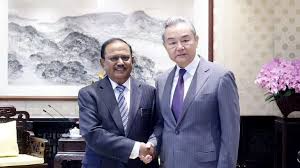Doval meets Wang Yi in China, calls for countering terrorism

In a key diplomatic move, India’s National Security Advisor Ajit Doval met China’s top diplomat Wang Yi in Beijing on June 23, 2025. The meeting took place during the Shanghai Cooperation Organisation’s (SCO) security officials’ summit. It was the first high-level visit by Doval to China since the 2020 border standoff.
The primary focus of the talks was terrorism. Doval urged China to support regional efforts to counter extremism, especially those coming from across India’s borders. Without directly naming Pakistan, he stressed the importance of taking firm action against terror infrastructure and cross-border attacks.
Firm Stand on Terrorism
Doval called on China to take a stronger stance against terrorism. “There can be no justification for terrorism,” he said. He added that countries must act together to eliminate networks that promote violence.
India has repeatedly raised concerns about terrorist groups operating from Pakistan. The recent terror attack in Pahalgam that killed several security personnel added urgency to India’s message. By raising the issue with Wang Yi, Doval aimed to pressure China into acknowledging India’s security concerns.
China has often taken a cautious approach when it comes to Pakistan. But there are signs that Beijing is willing to engage in dialogue about regional stability, especially within multilateral forums like the SCO.
Building Bilateral Trust
Along with terrorism, Doval and Wang discussed overall ties between India and China. The two sides reviewed recent developments since the 2020 Galwan Valley clash. Doval emphasized the need to restore peace and build trust along the Line of Actual Control (LAC).
He said both sides must continue dialogue at military and diplomatic levels. Confidence-building measures, trade cooperation, and cultural exchanges were also discussed as tools to stabilize relations.
Wang Yi welcomed the talks. He said China wants better communication and cooperation with India. He added that both countries must work together through global platforms like the SCO and BRICS.
A Regional Platform for Security
The meeting took place during the SCO summit of national security officials. This group includes India, China, Russia, Pakistan, and several Central Asian nations. The SCO provides a platform for members to discuss joint responses to terrorism, cybercrime, and drug trafficking.
India has consistently used the SCO to highlight terrorism as a shared threat. At the summit, Doval pushed for better intelligence-sharing and stronger collective action. His remarks echoed India’s belief that multilateral cooperation is key to regional peace.
By speaking at the SCO, India is trying to shift the focus from bilateral grievances to shared global threats. It also forces countries like China to take a position on terrorism that goes beyond diplomatic neutrality.
Wider Strategic Signals
This meeting comes at a time of global realignment. India is strengthening its partnerships with countries like the US, Japan, and Australia through the Quad. At the same time, it remains open to engaging China when interests align.
Some observers believe the meeting could lead to more talks between India and China. A new round of border talks between Special Representatives is likely later this year. If progress is made, it could ease tensions along the disputed border.
However, India remains cautious. Officials made it clear that diplomatic engagement cannot replace ground readiness. Ensuring sovereignty and security along the border remains India’s top priority.
Conclusion
The meeting between Doval and Wang Yi signals an effort to rebuild dialogue between two of Asia’s biggest powers. Doval’s strong stand on terrorism reflects India’s resolve to bring the issue to the global stage. China now has a chance to show whether it can be a responsible partner in regional stability.
Terrorism remains a threat that no country can afford to ignore. As India and China find areas of common interest, cooperation on security issues may serve as the starting point for broader reconciliation.






